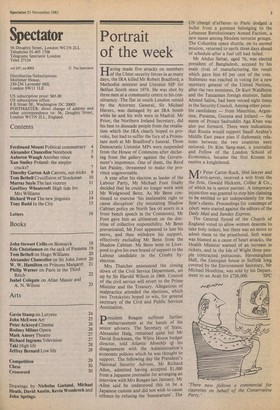Portrait of the week
Having made five attacks on members of the Ulster security forces in as many days, the IRA killed Mr Robert Bradford, a Methodist minister and Unionist MP for Belfast South since 1974. He was shot by three men at a community centre in his constituency. The flat in south London rented by the Attorney General, Sir Michael Havers, was damaged by an IRA bomb while he and his wife were in Madrid. Mr Prior, the Northern Ireland Secretary, did his best to dissuade people from the retaliation which the IRA clearly hoped to provoke, but had to suffer the fury of a Protestant mob at Mr Bradford's funeral. Three Democratic Unionist MPs were suspended from the House of Commons after declaring from the gallery against the Government's impotence. One of them, the Revd Ian Paisley, threatened to make the province ungovernable.
A year after his election as leader of the Labour Party, Mr Michael Foot finally decided that he could no longer work with Mr Wedgwood Benn. As Mr Benn continued to exercise 'his inalienable right to cause disruption' (by misstating Shadow Cabinet policy on North Sea oil assets in a front bench speech in the Commons), Mr Foot gave him an ultimatum on the doctrine of collective responsibility. Mr Benn prevaricated, Mr Foot appeared to lose his nerve, and then withdrew his support, effectively excluding Mr Benn from the Shadow Cabinet. Mr Benn went to Liverpool to give his own brand of support to the Labour candidate in the Crosby byelection.
Mrs Thatcher announced the closing down of the Civil Service Department, set up by Sir Harold Wilson in 1968. Control of the civil service will revert to the Prime Minister and the Treasury. Allegations of malpractice attended the elections, which two Trotskyists hoped to win, for general secretary of the Civil and Public Services Association.
ID resident Reagan suffered further embarrassment at the hands of his senior advisers. The Secretary of State, Alexander Haig, remained quiet but Mr David Stockman, the White House budget director, told Atlantic Monthly qf. his disagreement with the Administration's economic policies which he was thought to support. The following day the President's National Security Adviser, Mr Richard Allen, admitted having accepted $1,000 from a Japanese journalist for arranging an interview with Mrs Reagan last January. Mr Allen said he understood this to be a Japanese custom and did not wish to cause offence by refusing the 'honorarium'. The US charge d'affaires in Paris dodged a bullet from a gunman belonging to the Lebanese Revolutionary Armed Faction, a new name among Moslem terrorist groups. The Columbia space shuttle, on its second mission, returned to earth three days ahead of schedule after a fuel cell had failed.
Mr Abdus Sattar, aged 76, was elected president of Bangladesh, accused by his main rival of manufacturing the result which gave him 65 per cent of the vote. Stalemate was reached in voting for a new secretary general of the United Nations, after the two nominees, Dr Kurt Waldheim and the Tanzanian foreign minister, Salim Ahmed Salim, had been vetoed eight times in the Security Council. Among other possible candidates — from Mauritius, Argentina, Panama, Guyana and Ireland — the name of Prince Sadruddin Aga Khan was also put forward. There were indications that Russia would support Saudi Arabia's Middle East peace plan if diplomatic relations between the two countries were restored. Dr Kim Sang-man, a journalist and Fellow of the London School of Economics, became the first Korean to receive a knighthood.
Mr Peter Carter-Ruck, libel lawyer and writ-server, received a writ from the the firm, Oswald Hickson, Collier & Co., of which he is senior partner. A temporary injunction was granted to stop him claiming to be entitled to act independently for the firm's clients. Proceedings for contempt of court were started against the editors of the Daily Mail and Sunday Express.
The General Synod of the Church of England voted to allow women deacons to take holy orders, but there was no move to admit them to the priesthood. Soft water was blamed as a cause of heart attacks, the Health Minister warned of an increase in rickets, and in the Isle of Wight three people contracted psittacosis. Heveningham Hall, the Georgian house in Suffolk long coveted by the Environment Secretary, Mr Michael Heseltine, was sold by his Depart ment to an Arab for 026,000. SPC










































 Previous page
Previous page